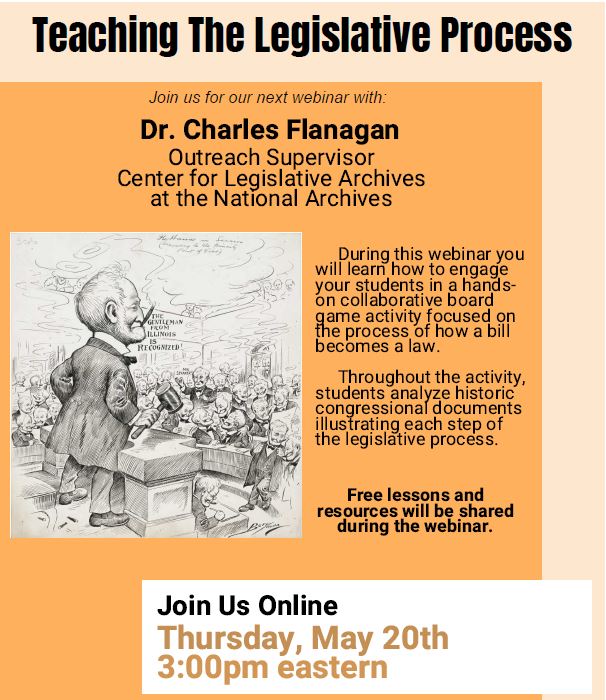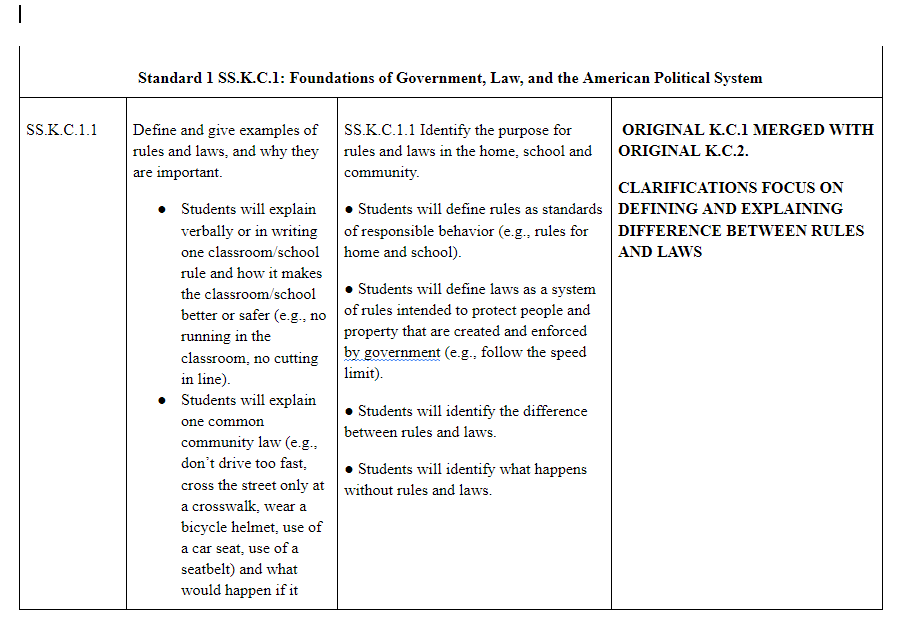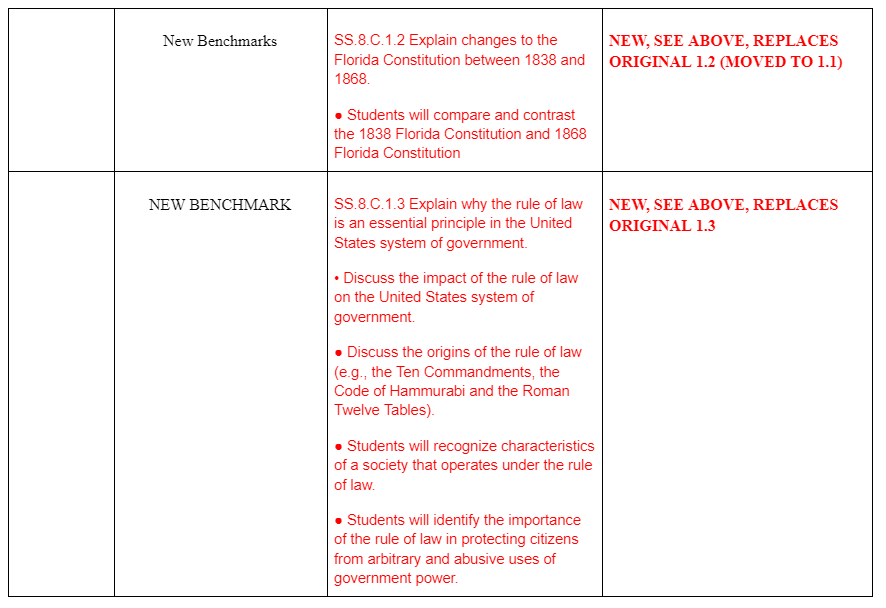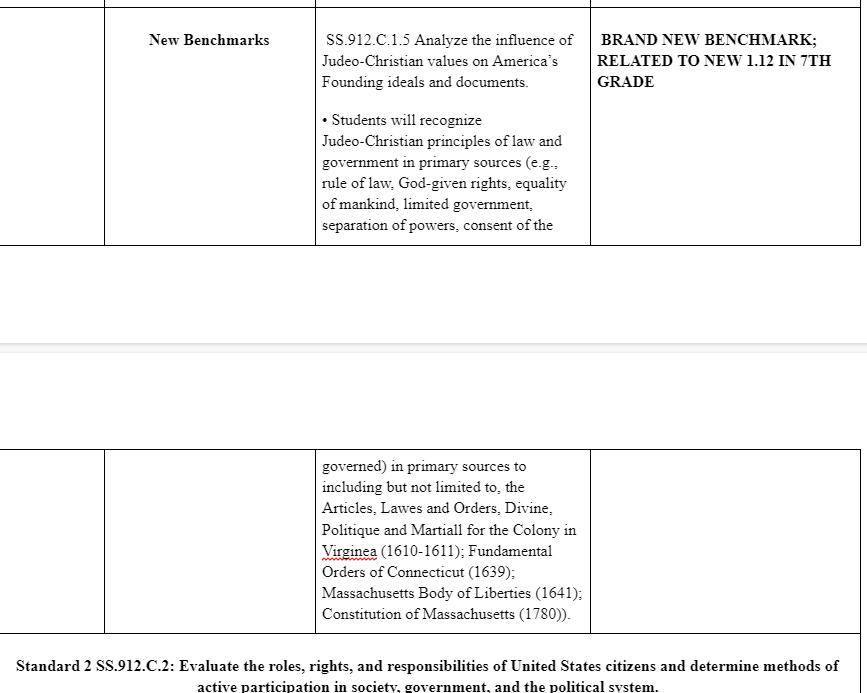The Justice Sandra Day O’Connor Civic Education Act
Any discussion of civics in Florida, and its success, begins with the Justice Sandra Day O’Connor Civic Education Act. Passed in 2010, this Act required the creation and implementation of a civics course in middle school. This course includes an end-of-course exam that counts as 30% of a student’s final grade, as well as for school grade and teacher evaluation. In addition, in order to go on to high school, students MUST pass civics. So since at least 2013, as civics was implemented, Florida has had a strong civic education initiative. Every middle school student in the state of Florida MUST pass civics.
What Is Required?
The middle school civics course in Florida contains 40 benchmarks, 35 of which are directly assessed on the End of Course Assessment. The standards are traditionally organized into 4 reporting categories:
- Origins and Purposes of Law and Government
- Roles, Rights, and Responsibilities of Citizens
- Government Policies and Political Processes
- Organization and Function of Government
You can further break these down into 9 topic areas that cover a wide variety of civics content and benchmarks:
So, what is covered in these benchmarks? Essentially, the benchmarks address the comprehensive knowledge that students need to be engaged with civic life in the United States, from the workings of the US Constitution to the role of political parties in the United States and everything in between! You can review each of the benchmarks below, organized by reporting category. Click on the link to go to Florida Joint Center for Citizenship resources for each one! It should be noted that the state has adopted new benchmarks as of July 14th, effective for 2023-2024. But this is what they are right now.
Origins and Purposes of Law and Government
Reporting Category One
| Benchmark Resources | Description |
|---|---|
| SS.7.C.1.1 | Recognize how Enlightenment ideas including Montesquieu’s view of separation of power and John Locke’s theories related to natural law and how Locke’s social contract influenced the Founding Fathers. |
| SS.7.C.1.2 | Trace the impact that the Magna Carta, English Bill of Rights, Mayflower Compact, and Thomas Paine’s “Common Sense” had on colonists’ views of government. |
| SS.7.C.1.3 | Describe how English policies and responses to colonial concerns led to the writing of the Declaration of Independence. |
| SS.7.C.1.4 | Analyze the ideas (natural rights, role of the government) and complaints set forth in the Declaration of Independence. |
| SS.7.C.1.5 | Identify how the weaknesses of the Articles of Confederation led to the writing of the Constitution. |
| SS.7.C.1.6 | Interpret the intentions of the Preamble of the Constitution. |
| SS.7.C.1.7 | Describe how the Constitution limits the powers of government through separation of powers and checks and balances. |
| SS.7.C.1.8 | Explain the viewpoints of the Federalists and the Anti-Federalists regarding the ratification of the Constitution and inclusion of a bill of rights. |
| SS.7.C.1.9 | Define the rule of law and recognize its influence on the development of the American legal, political, and governmental systems. |
| SS.7.C.3.10 | Identify sources and types (civil, criminal, constitutional, military) of law. |
Roles, Rights, and Responsibilities of Citizens
Reporting Category Two
| Benchmark Resources | Description |
|---|---|
| SS.7.C.2.1 | Define the term “citizen,” and identify legal means of becoming a United States citizen. |
| SS.7.C.2.2 | Evaluate the obligations citizens have to obey laws, pay taxes, defend the nation, and serve on juries. Also Assesses: SS.7.C.2.3—Experience the responsibilities of citizens at the local, state, or federal levels. Also Assesses: SS.7.C.2.14—Conduct a service project to further the public good. |
| SS.7.C.2.4 | Evaluate rights contained in the Bill of Rights and other amendments to the Constitution. |
| SS.7.C.2.5 | Distinguish how the Constitution safeguards and limits individual rights. |
| SS.7.C.3.6 | Evaluate Constitutional rights and their impact on individuals and society. |
| SS.7.C.3.7 | Analyze the impact of the 13th, 14th, 15th, 19th, 24th, and 26th amendments on participation of minority groups in the American political process. |
| SS.7.C.3.12 | Analyze the significance and outcomes of landmark Supreme Court cases including, but not limited to, Marbury v. Madison, Plessy v. Ferguson, Brown v. Board of Education, Gideon v. Wainwright, Miranda v. Arizona, in re Gault, Tinker v. Des Moines, Hazelwood v. Kuhlmier, United States v. Nixon, and Bush v. Gore. |
Government Policies and Political Processes
Reporting Category Three
| Benchmark Resources | Description |
|---|---|
| SS.7.C.2.8 | Identify America’s current political parties, and illustrate their ideas about government. |
| SS.7.C.2.9 | Evaluate candidates for political office by analyzing their qualifications, experience, issue-based platforms, debates, and political ads. Also Assesses: SS.7.C.2.7—Conduct a mock election to demonstrate the voting process and its impact on a school, community, or local level. |
| SS.7.C.2.10 | Examine the impact of media, individuals, and interest groups on monitoring and influencing government. |
| SS.7.C.2.11 | Analyze media and political communications (bias, symbolism, propaganda). |
| SS.7.C.2.12 | Develop a plan to resolve a state or local problem by researching public policy alternatives, identifying appropriate government agencies to address the issue, and determining a course of action. |
| SS.7.C.2.13 | Examine multiple perspectives on public and current issues. |
| SS.7.C.4.1 | Differentiate concepts related to United States domestic and foreign policy. |
| SS.7.C.4.2 | Recognize government and citizen participation in international organizations. |
| SS.7.C.4.3 | Describe examples of how the United States has dealt with international conflicts. |
Organization and Function of Government
Reporting Category Four
| Benchmark Resources | Description |
|---|---|
| SS.7.C.3.1 | Compare different forms of government (direct democracy, representative democracy, socialism, communism, monarchy, oligarchy, autocracy). |
| SS.7.C.3.2 | Compare parliamentary, federal, confederal, and unitary systems of government. |
| SS.7.C.3.3 | Illustrate the structure and function (three branches of government established in Articles I, II, and III with corresponding powers) of government in the United States as established in the Constitution. |
| SS.7.C.3.4 | Identify the relationship and division of powers between the federal government and state governments. |
| SS.7.C.3.5 | Explain the Constitutional amendment process. |
| SS.7.C.3.8 | Analyze the structure, functions, and processes of the legislative, executive, and judicial branches. Also Assesses: SS.7.C.3.9—Illustrate the law making process at the local, state, and federal levels. |
| SS.7.C.3.11 | Diagram the levels, functions, and powers of courts at the state and federal levels. Also Assesses: SS. 7.C.2.6—Simulate the trial process and the role of juries in the administration of justice. |
| SS.7.C.3.13 | Compare the constitutions of the United States and Florida. |
| SS.7.C.3.14 | Differentiate between local, state, and federal governments’ obligations and services. |
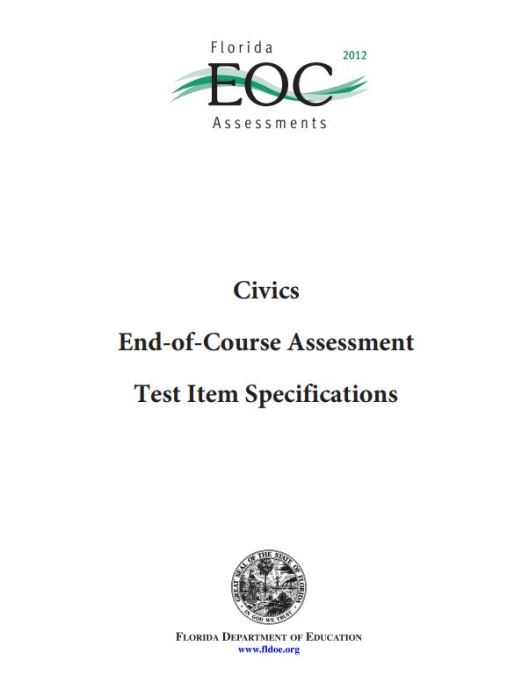
Each benchmark is further broken down into individual benchmark clarifications that tell stakeholders what they are expected to know. You can get a copy of these clarifications here, provided in the Test Item Specifications.
What Does the Data Say?
Good news on the data front when it comes to civics! As of the 2019 Civics EOCA administration, 71% of all students that took the exam scored a 3, 4, or 5. What this means is that 71% of all students passed the Civics End Of Course Assessment. This is 10 percentage points higher than the initial administration from 2014! As the charts below (from the Florida Department of Education) indicate, we are also seeing some positive growth among minority students as well. This is a trend that we hope to see continue, as FJCC and other organizations continue to work hard to provide resources and support for teachers and students.


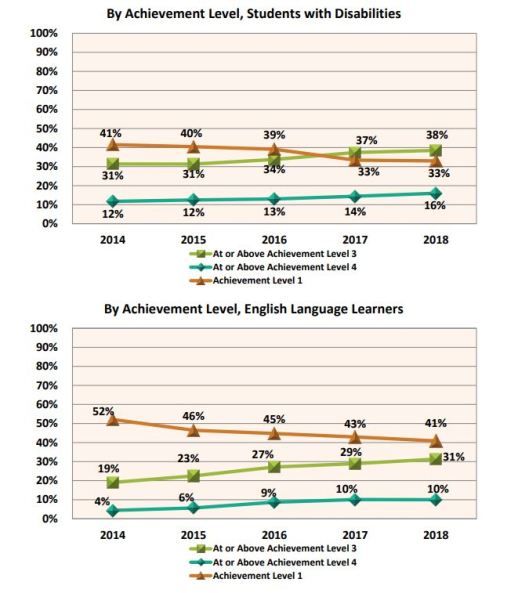
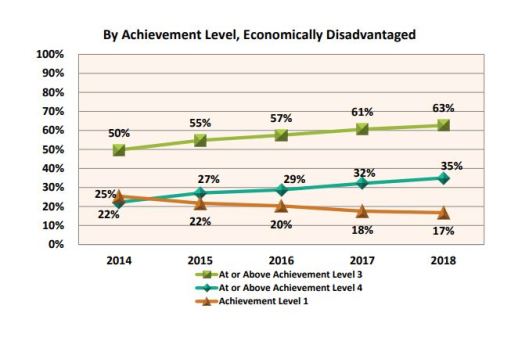
So What Needs to Improve?
Without a doubt, Florida has seen significant positive results from the implementation of civic education at the middle school level. At this point, as a state, we are doing well with the knowledge aspect. But there is certainly room for improvement. At FJCC, we have been working to build a collection of resources and supports that address the skills and dispositions that can be used in conjunction with the knowledge that students have gained. You know how government works, and the role the Constitution plays in your life. So what can you do with that knowledge? We are working with organizations like the Civics Renewal Network, the Boys and Girls Clubs of Central Florida, the Constitutional Rights Foundation, and others to improve opportunities for engagement.
We also need to do far more in elementary schools. That, however, is a bit of a sticky wicket, as social studies as a whole has struggled for attention in elementary schools; the pressure of preparing students for math, ELA, and science assessments has often crowded out untested content areas like social studies, both here and Florida and nationally.

That beings said, there ARE some good resources out there, like FJCC’s own Civics in a Snap. Civics in a Snap is a collection of K-5 lessons around civics content and questions that can be done in an elementary class in about 15 to 20 minutes. Take a look!

We are also thinking about ways in which we can do more at the high school level to engage students in experiential learning around civic knowledge, skills, and dispositions.
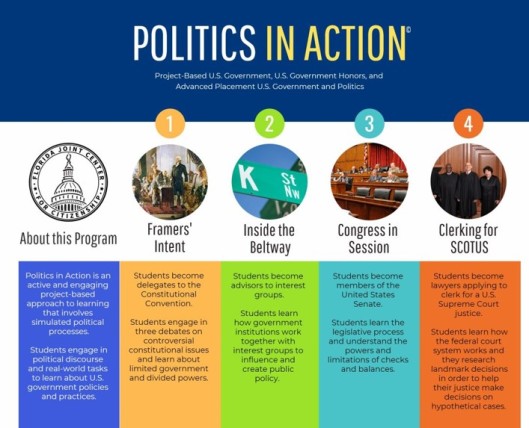
Moving Forward
We at the Florida Joint Center for Citizenship at the Lou Frey Institute at the University of Central Florida applaud the governor’s call for a prioritization of civic education. We hope that it includes an in depth consideration of ways in which we get students to engage in civic life at all levels, and a renewed focus on getting social studies back into the elementary schools. And the continued leadership that Florida has shown in quality civics teaching and learning!
And be sure to check out Civics360 to find videos and readings related to the civics content that kids here in Florida need to learn! It’s all free! And we will update these resources to align with the new benchmarks.




